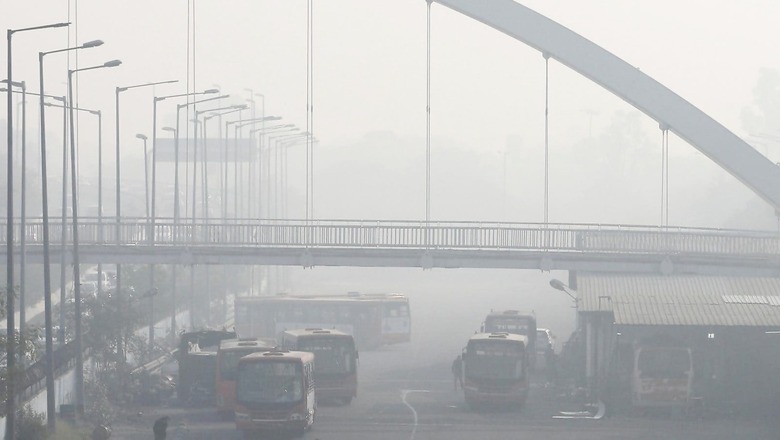
views
Diwali season is here and with it comes the biggest challenge that the national capital faces – air pollution. The Supreme Court on Thursday intervened after a verbal duel between the BJP and AAP in Delhi over the ban on fireworks. The top court refused to lift the cracker ban imposed by the Delhi government calling for clean Diwali celebrations.
With regards to Delhi’s AQI this time, there might be some respite for the city from the unbreathable air during this time of the year. According to a recent report by Centre for Science and Environment or CSE, the average PM2.5 pollution in Delhi in the winter season has declined by about 20% as compared to the pre-pandemic period, but this time too stubble burning could play spoilsport yet again.
As per the report, Diwali festivities are to be celebrated earlier than usual which means “the warmer and windier conditions will help dilute the pollution that is staple of Diwali night celebrations in Delhi.”
PM2.5 Levels Dip in NCR Region
While Delhi showed a 20% improvement in the PM 2.5 pollutant levels, Ghaziabad registered a 30% improvement, the highest among all major cities, but its PM2.5 level was still about 2.5 times the 24-hour standard, the report said.
“Greater Noida reported 28% improvement, Noida 23% and Faridabad 16%,” the report said adding that with 11% improvement, Gurugram was the worst performer among the core NCR cities. “In absolute concentration terms, Faridabad, with an average of 159 microgram per cubic metre, was the most polluted city of the NCR last winter,” the report said.
Weather Gods Bring Respite
Apart from a decline in PM2.5 levels and favourable wind conditions, the smoke from the farm stubble fires has not overwhelmed the air quality of the NCR yet unlike the last two years. Rains in early October have kept the air relatively clean so far. But the study suggests that as per previous years’ data, Diwali night can add 300-600 microgram per cubic metre of PM2.5 to Delhi’s air if the business-as-usual scenario continues.
Delhi’s AQI remained in the “very poor” category at an AQI of 228 and to prevent it from worsening, the Commission for Air Quality Management (CAQM) on Wednesday directed authorities to enact stage two of GRAP air quality plan, which includes banning the use of coal and firewood in hotels, restaurants and open eateries.
An AQI between zero and 50 is considered good, 51 and 100 satisfactory, 101 and 200 moderate, 201 and 300 poor, 301 and 400 very poor, and 401 and 500 severe.
Punjab Stubble Burning Issue
Even as reports suggest that Delhi could see a cleaner, less polluted Diwali season, in the neighboring state of Punjab, there was a nearly three-fold jump in farm fire incidents in the last nine days, with total number of such cases reaching 2,625 so far this season. From September 15 till October 10 this year, the state had witnessed 718 stubble burning incidents.
According to data from the Ludhiana-based Punjab Remote Sensing Centre, the state recorded 436 farm fire cases on Wednesday. From September 15 till October 19, a total of 2,625 farm fire incidents have been recorded, as per the data.
However, the reports claims that the situation looks better this year compared to farm fire incidents in the last two years. The farmers in the state say they continue the practice of stubble burning as they have no other option.
‘Spend on sweets instead of crackers’
Meanwhile, after the Delhi government had ordered a complete ban on firecrackers, the Supreme Court on Thursday refused an urgent hearing of a plea seeking the removal of complete ban on firecrackers in the national capital, saying “let the people of Delhi breathe clean air”. The plea was filed by BJP MP Manoj Tiwari.
A bench of Justices M R Shah and M M Sundresh refused to list the plea challenging the direction issued by Delhi Pollution Control Committee (DPCC) on September 14 for a complete ban on manufacturing, storage, sale and bursting of all kinds of firecrackers till January 1, 2023, in Delhi.
“Let the people of Delhi breathe clean air. People should not spend money on firecrackers instead they should eat sweets,” the bench said and added that plea will be coming up for hearing along with the main matter pending before the court.
Earlier on Thursday, noting the pendency of issues related to firecrackers before the Supreme Court, the Delhi High Court too refused to entertain a petition challenging the ban on sale and use of all kinds of firecrackers in the national capital.
‘Jail for Firecracker Use’
In a bid to tackle the annual issue of falling air quality, the Delhi government on Wednesday put out a warning that those found purchasing and bursting of firecrackers in the city can be punished with jail time.
The Delhi Environment Minister Gopal Rai said the government was prepared to enforce the ban on firecrackers across the city this Diwali, adding that teams have been set up to keep a tab on violators.
Green Cracker Diwali
To fight the pollution problem post Diwali, states across the country have called for the use of green crackers. Some states have also allotted a specific window during which people will be allowed to burst firecrackers. The use of green crackers was permitted by the Supreme Court in a bid to curb air pollution.
(With inputs from PTI)
Read all the Latest News India and Breaking News here

















Comments
0 comment